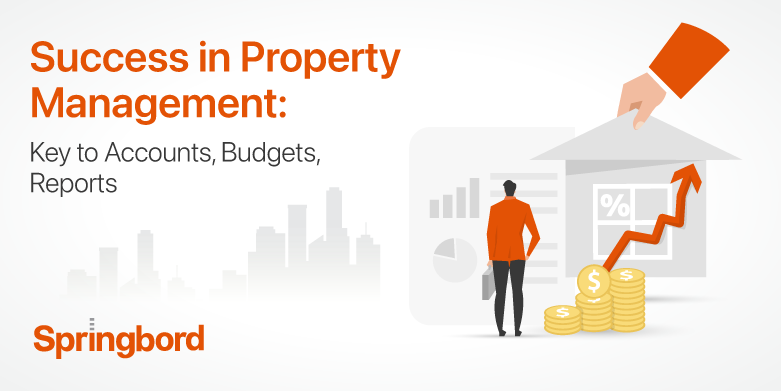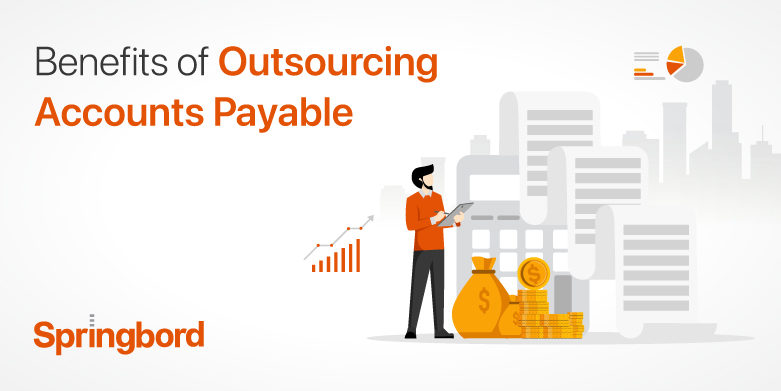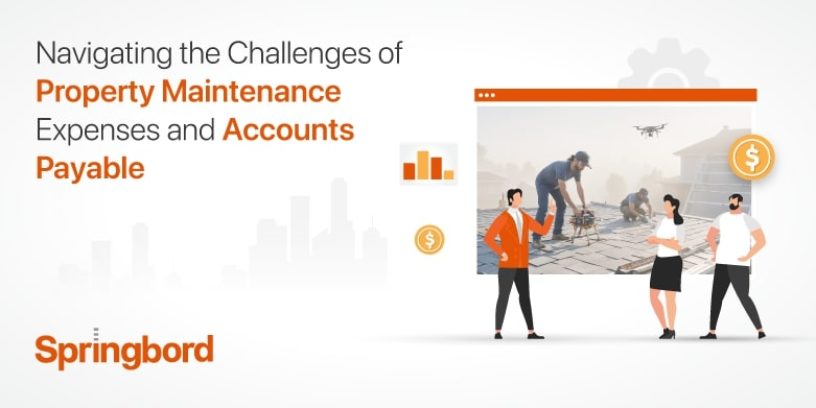 Read time 6 min
Read time 6 minMaintaining a property’s safety, functionality, and appeal to renters is an essential part of managing a real estate investment. However, navigating the financial landscape of property maintenance expenses and accounts payable can be a significant challenge for property managers and owners.
This blog delves into the intricacies of managing maintenance costs, optimizing accounts payable processes, and implementing strategies to maintain financial stability while preserving property value. Our accounts payable services can help streamline your financial management, allowing you to focus on what truly matters: your tenants and your properties.
Proper property maintenance is not just a matter of aesthetics or convenience but a fundamental component of property value retention and tenant satisfaction.
For business owners managing multiple properties, maintaining a well-kept environment is essential for attracting and retaining high-quality tenants, ensuring long-term revenue stability, and avoiding costly repairs.
Importance of Property Maintenance
Property maintenance plays a vital part in preserving a property’s value and ensuring tenant satisfaction. Well-maintained properties are more likely to attract higher-quality tenants, which in turn increases demand and rental income.
Furthermore, happy tenants significantly contribute to property appreciation by maintaining higher occupancy rates and reducing turnover costs.
High tenant satisfaction is often correlated with regular and effective maintenance. A study by Property Meld highlights that high rent retention rates indicate high resident satisfaction, which is essential for maintaining a positive reputation in property management.
Tenants are more likely to renew leases and recommend the property to others if their maintenance needs are promptly and efficiently addressed.
Accounts Payable Complexity
Managing accounts payable (AP) for property maintenance is a complex and multifaceted task. The sheer volume of transactions and the variety of vendors involved make it a challenging endeavour. Property managers have many bills to keep track of, correct data entry to ensure services are rendered and monitor on-time payments.
One of the primary challenges is the management of utility and maintenance costs. The misclassification of costs and the handling of paper invoices and receipts further complicate the process, leading to inefficiencies and potential financial discrepancies.
Springbord offers tailored solutions to address these challenges. Our services include comprehensive AP management and maintenance oversight, ensuring that all transactions are tracked accurately, and payments are processed efficiently.
Common Challenges in Property Maintenance
Property maintenance is a critical aspect of property management that directly impacts the value and operational efficiency of assets.
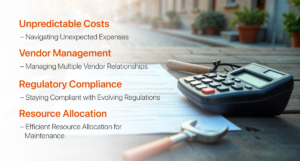
For business owners, managing these expenses can be a significant challenge, affecting both short-term cash flow and long-term financial planning.
Unpredictable Costs
One of the most daunting challenges in property maintenance is the unpredictability of costs. Maintenance expenses can vary widely due to unforeseen repairs, natural wear and tear, and emergencies. For example, in 2023, homeowners spent an average of $6,548 on maintenance, a $400 increase from the previous year (Forbes, 2023).
These unexpected expenses can strain budgets and disrupt financial planning, making it essential for property managers to develop accurate cost estimations and establish contingency funds.
Vendor Management
Managing multiple vendors is another significant challenge. Property managers must negotiate contracts, ensure timely payments, and monitor vendor performance.
Effective vendor management is crucial for maintaining service quality and controlling costs. The complexity increases with the number of vendors involved, each with unique terms and service levels.
Regulatory Compliance
Adhering to local regulations and building codes is non-negotiable but often challenging. Regulatory compliance can drive up maintenance costs and add to the administrative burden. Non-compliance can result in fines, legal issues, and even property closures.
Property managers must stay updated with evolving regulations and ensure all maintenance activities meet these standards.
This requires continuous monitoring and collaboration with legal experts to navigate the regulatory landscape effectively.
Resource Allocation
Efficiently allocating resources to various maintenance tasks is a persistent challenge. Property managers need to prioritize tasks based on urgency, cost, and impact on property value. Inefficient resource allocation can lead to neglected maintenance, resulting in higher repair costs and tenant dissatisfaction.
A strategic approach to resource allocation involves regular inspections, data-driven decision-making, and leveraging technology to streamline maintenance operations.
At Springbord, our expertise ensures that your property maintenance operations are efficient and cost-effective. By partnering with us, you can focus on strategic growth while we handle the complexities of property maintenance and accounts payable.
Strategies for Effective Expense Management
Managing property maintenance expenses is a critical task for property managers and business owners.
Effective expense management involves a combination of preventive maintenance programs, accurate cost estimation and budgeting, and the use of advanced technologies like CMMS (Computerized Maintenance Management Systems).
These strategies not only help in minimizing emergency repairs but also ensure the longevity of property assets and optimize financial planning.
Preventive Maintenance Programs
Preventive maintenance (PM) involves regular and planned maintenance activities designed to prevent unexpected equipment failures and extend the lifespan of property assets.
Implementing a preventive maintenance program can lead to significant cost savings and operational efficiencies.
Key Advantages:
- Cost Savings: Regular maintenance helps in identifying and fixing minor issues before they escalate into major problems, reducing the need for costly emergency repairs.
- Increased Asset Lifespan: Routine maintenance activities ensure that property assets remain in optimal condition, thereby extending their operational life.
- Minimized Downtime: By scheduling maintenance activities, property managers can prevent unexpected breakdowns and ensure that assets are available when needed.
Cost Estimation and Budgeting
Effective expense management starts with accurate cost estimation and budgeting. Property managers need to forecast maintenance expenses accurately to avoid budget shortfalls and ensure financial stability.
According to the International Facility Management Association (IFMA), maintenance costs can constitute up to 30% of a facility’s operating budget.
Techniques for Cost Estimation:
- Historical Data Analysis: Reviewing past maintenance records helps in predicting future expenses. This involves analyzing previous maintenance costs, frequency of repairs, and seasonal variations.
- Condition-Based Monitoring: Implementing condition-based monitoring systems to assess the real-time condition of assets and forecast maintenance needs.
- Contingency Funds: Allocating contingency funds for unanticipated repair activities ensures that sudden expenses do not disrupt the overall budget.
Use of Technology
Technological advancements have revolutionized property maintenance management.
Computerized Maintenance Management Systems (CMMS) play a pivotal role in tracking maintenance activities, managing work orders, and controlling expenses.
Advantages of CMMS:
- Centralized Data Management: CMMS centralizes all maintenance-related data, making it easily accessible for decision-making and reporting.
- Automated Work Orders: Automation of work orders streamlines the maintenance process, reducing manual errors and improving efficiency.
- Predictive Analytics: Advanced CMMS systems incorporate predictive analytics to forecast maintenance needs based on historical data and real-time asset conditions.
Optimizing Accounts Payable Processes
Optimizing accounts payable (AP) processes is important for maintaining financial health and operational efficiency.
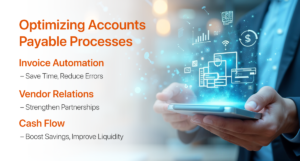
By streamlining invoice processing, building strong vendor relationships, and managing cash flow effectively, businesses can significantly reduce errors, enhance productivity, and ensure smooth financial operations.
Streamlined Invoice Processing
Automating invoice processing is a game-changer for businesses aiming to enhance efficiency and reduce errors.
Traditional manual invoice processing is time-consuming and prone to mistakes, leading to delayed payments and strained vendor relationships.
According to a report by iTWire, nearly 90% of businesses believe that automating invoice management and supplier interactions can significantly improve their AP processes.
Key Benefits:
- Reduced Errors: Automation minimizes manual data entry, significantly reducing the likelihood of errors.
- Increased Efficiency: Automated systems process invoices faster than manual methods, leading to quicker payment cycles.
- Cost Savings: By reducing manual work and errors, businesses can lower processing costs. A study found that companies using automated invoice processing systems reported a 29% reduction in processing costs (PayStream Advisors, 2024).
Vendor Relationships and Negotiations
Effective vendor management is essential for smooth AP processes.
Building strong relationships with vendors involves clear communication, timely payments, and mutually beneficial negotiations.
Strategies for Effective Vendor Management:
- Transparent Communication: Regularly communicate with vendors about expectations, requirements, and any changes in processes.
- Timely Payments: Ensure that invoices are paid on time to build trust and reliability.
- Negotiating Favorable Terms: Negotiate terms that benefit both parties, such as early payment discounts or extended payment terms, which can improve cash flow.
Cash Flow Management
Efficient cash flow management is essential for the stability and growth of any business. Proper management of accounts payable can significantly impact cash flow.
For instance, leveraging early payment discounts and optimizing payment schedules are effective strategies.
Effective Cash Flow Strategies:
- Early Payment Discounts: Taking advantage of early payment discounts can result in substantial savings. For example, a typical 2/10 net 30 discount translates to a 36% annual return on cash used to pay early.
- Optimizing Payment Schedules: Align payment schedules with your cash flow cycles to ensure sufficient liquidity. This involves balancing early payments with the need to maintain adequate cash reserves.
By focusing on automating invoice processing, building strong vendor relationships, and managing cash flow efficiently, businesses can significantly enhance their accounts payable processes.
At Springbord, we are dedicated to providing the expertise and tools needed to achieve these goals, ensuring operational efficiency and financial stability.
Conclusion
Effectively managing property maintenance expenses and accounts payable is critical for maintaining financial health, enhancing operational efficiency, and ensuring tenant satisfaction.
By implementing strategies such as preventive maintenance programs, accurate cost estimation, leveraging technology like CMMS, automating invoice processing, and optimizing cash flow management, property managers and business owners can navigate the complexities of these tasks with greater ease and success.
At Springbord, we offer comprehensive solutions tailored to address these challenges. Our expertise in property maintenance, accounts payable automation, vendor management, and cash flow optimization ensures that your business operates smoothly and efficiently.
Partner with Springbord to streamline your processes, enhance financial performance, and achieve long-term success.






